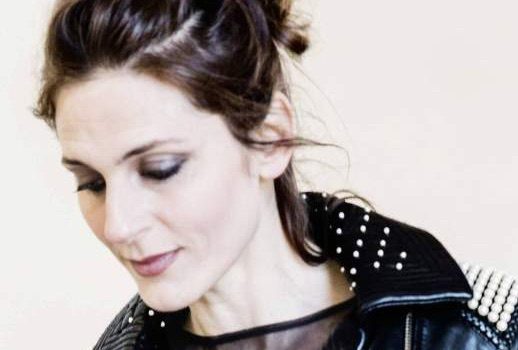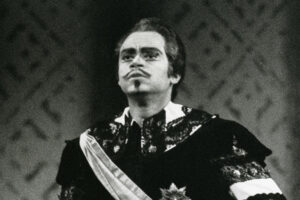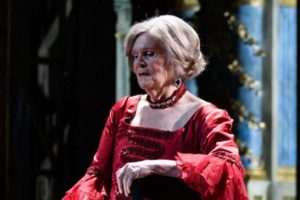

Contralto Delphine Galou.
Since tomorrow will be “Met Reveal Thursday,” “Trove Valentine’s Day” further stokes Semiramis-fever with another of the celebrated works about the infamous queen: La Semiramide riconosciuta, a superb 1729 opera by Nicola Porpora.
Several years ago the brilliant Italian mezzo Anna Bonitatibus released a double-CD set devoted to Semiramide featuring arias by fourteen composers from Caldara to Manuel Garcia including one from a second Porpora opera Semiramide Regina dell’Assiria.
Porpora was extremely prolific, creating more than four dozen operas during a 50-year career; in addition he taught singing to several of the most famous castrati: Senesino, Caffarelli and Farinelli. At the height of his fame he was asked to lead the Opera of the Nobility in London to become Handel’s great rival and his Arianna a Nasso opened new company’s first season in 1734 starring Farinelli. Aci’s great aria “Alto Giove” from Polifemo, composed for Porpora’s second London season, is prominently featured in the current Broadway show Farinelli and the King.
If his works lack the depths and psychological complexity of Handel’s, his arias are consistently beguiling and occasionally moving. Semiramide riconosciuta can sometimes seem disconcertingly jaunty for an intrigue-filled opera seria but one can readily hear why the piece was one of the composer’s biggest successes and one which he revived ten years later composing new arias for Caffarelli including one sung by Franco Fagioli on his remarkable CD dedicated to that celebrated singer.
Porpora was the second composer to set Metastasio’s insanely complicated libretto, as usual Leonardo Vinci got first shot for Rome and his opera premiered during the same Carnival season as Porpora’s did in Venice. For nearly a century many others followed (Jommelli alone set it three different times!) including Gluck, Salieri and Meyerbeer whose early Italian opera was recorded by Richard Bonynge and issued on Naxos.
The earliest non-Metastasio opera that I’ve heard on this fascinating figure is Cesti’s La Semirami from 1667—a splendid work that Alan Curtis revived at the 1987 Innsbruck Festival.
To mark the 250th anniversary of his death Porpora is getting some deserved attention; Theater an der Wien mounted Arianna last fall and a staging of the 1736 Mitridate (there was also one in 1730) just completed a run in Heidelberg.
I have a fondness for Elena Cecchi Fedi’s CD of six of his cantatas, but collections of Porpora’s opera arias are becoming more the fashion with fairly recent disks by Fagioli, Karina Gauvin and Philippe Jaroussky and next month another one by Max-Emanuel Cencic will be issued.
Cencic also portrays the title role in an important Porpora recording—the complete Germanico in Germania (contender for the prize for all-time clunky baroque opera title?) which came out last month. I’ve heard tantalizing bits and pieces of the Decca release…
…as well as a complete live performance last year from Krakow with many of the same performers. This exciting trio from that performance features Cencic, Mary-Ellen Nesi and Dilyara Idrisova.
Though Semiramide Riconosciuta’s premiere included three of the greatest castrati—Farinelli, Nicolino and Domenico Gizzi—today’s broadcast features women in their three roles with its heroine surprisingly sung by a contralto!
Porpora: La Semiramide riconisicuta
Beaune Festival
8 July 2011
Broadcast
Semiramide: Delphine Galou
Scitalce: Blandine Staskiewicz
Mirteo: Teodora Gheorghiu
Sibari: Mary-Ellen Nesi
Tamiri: Maria Grazia Schiavo
Ircano: Juan Sancho
Accademia Bizantina
Conductor: Stefano Montanari
Both this week’s Semiramde as well as last week’s Rossini can be downloaded by clicking on the icon of a square with an arrow pointing downward on the audio player and the resulting mp3 file will appear in your download directory.
“Trove Thursday” podcasts since the series began in September 2015 remain available from iTunes for free, or via any RSS reader.
























Comments